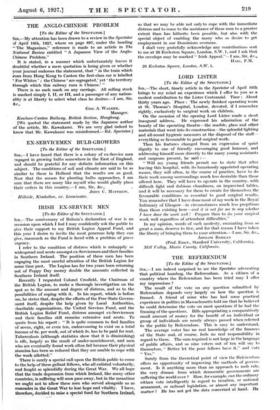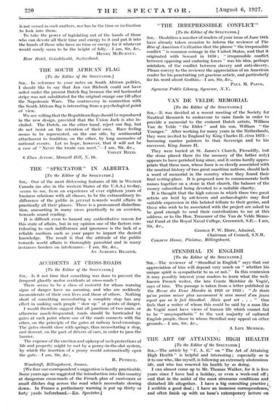THE REFERENDUM
[To the Editor of the SPECTATOR.] SIII,—I am indeed surprised to see the Spectator advocating that political humbug, the Referendum. As a citizen of a country where the Referendum has been tried may I offer my impressions ?
The result of the vote on any question submitted by Referendum depends very largely on how the question is framed. A friend of mine who has had some practical experience in politics in Massachusetts told me that he believed he could determine the vote on most questions if he had the framing of the questions. Bills appropriating a comparatively small amount of money for the benefit of an individual or group of individuals are nearly always passed when referred to the public by Referendum. This is easy to understand.
The average voter has no real knowledge of the finances of the State and, of course, feels no real responsibility in regard to them. The sum required is not large in the language Of public affairs, and so nine voters out of ten will say to themselves, " Better let the poor fellows have it," and vote " Yes."
Surely from the theoretical point of view the Referendum offers no opportunity of improving the methods of govern- ment. Is it anything more than an approach to mob rule, the very disease from which democratic governments are
suffering the world over ? How, for example, can the ordinary citizen vote intelligently in regard to taxation, or national armament, or railroad legislation, or almost any important matter ? He has not got the data concerned at hand. He
is not versed in such matters, nor has he the time or inclination to look into them.
To take the power of legislating out of the hands of those who can devote all their time and energy to it and put it into the hands of those who have no time or energy for it whatever would surely seem to be the height of folly.—I am, Sir, &c., HENRY McBuRNEY. Bear Hotel, Grindelwald, Switzerland.







































 Previous page
Previous page